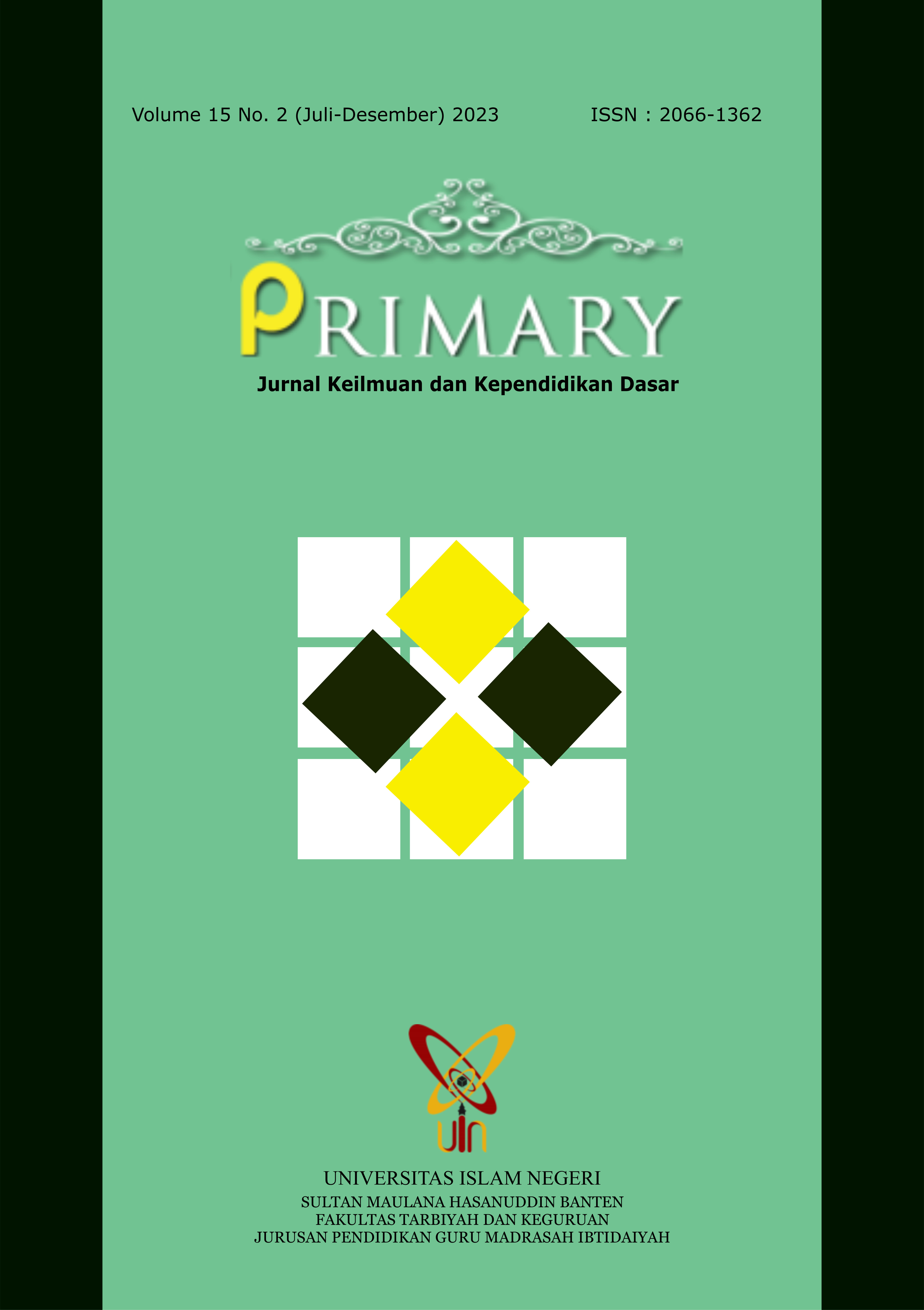PENGEMBANGAN MODUL MATEMATIKA BERBASIS RME UNTUK SISWA KELAS 1 SEKOLAH DASAR
 DOI:
DOI:
https://doi.org/10.32678/primary.v15i2.9669
 Abstract viewed : 356 times
|
Abstract viewed : 356 times
|  PDF (Bahasa Indonesia) downloaded : 407 times
PDF (Bahasa Indonesia) downloaded : 407 times
Keywords:
Mathematics, Modules, Realistic Mathematic Education, Elementary SchoolAbstract
Based on observations, there are low mathematics scores for measurement material in 2 different schools. This happened due to the COVID 19 factor and lack of parental guidance. Therefore, as a reference, researchers developed RME-based mathematics teaching materials in the form of realistic mathematics education-based modules. This research uses the R&D method. aims to determine the procedures, feasibility and effectiveness of the module. Based on the research carried out, the results of the research are: procedures carried out based on the ADDIE model, validation from media and material experts respectively 75% and 76%. And this product is considered effective because it can liven up the classroom atmosphere and get student and teacher questionnaire scores of 100% and 85% respectively.
Downloads
References
Ahdiyah, R. H. (2020). Pengembangan Lembar Kerja Siswa (LKS) Berbasis Mathematics Education (RME) Untuk Meningkatkan Hasil Belajar Matematika Pada Materi Operasi Perkalian. Serang: Doctoral disertation UIN SMH Banten .
Futihat, S., Wibowo, E. W., & Mastoah, I. (2020). Pengembangan Media Puzzle Huruf untuk meningkatkan kemampuan siswa dalam membaca permulaan. jurnal Ibtida'i, 7(2), 137.
Masruroh, K. A. (2020). Pengembangan Modul Matematika Berbasis Pendekatan Realistic Mathematics Education pada Materi Kelipatan dan Faktor Bilangan Kelas IV Sekolah Dasar. Diskusi Panel Nasional Pendidikan Matematika (p. 137). Jakarta : Unindra .
Nasional, D. P. (2003). Undang-undang No 20 . Jakarta: Dendiknas .
Pribadi, B. A. (2009). Model-model Desain Pembelajaran . Jakarta: Dian Rakyat.
Purnamasari, R. (2015). Peningkatan Hasil Belajar Matematika Tentang Pecahan Melalui Pendekatan Matematika Realistik. Jurnal Pendidikan Dasar, 6, 119.
Rahmawati, A. (2019). Penerapan Bahan Ajar Matematika Berbasis Realistic Mathematics Education (RME) Terhadap Kemampuan Pemecahan Masalah Matematis Siswa Pada Materi Perbandingan. PEKA, 3(1), 23.
Sembiring, R. K. (2010). Pendidikan Matematika Realistik Indonesia (PMRI): Perkembangan dan Tantangannya. Juornal on Mathematics Education, 1(1), Kemendikbud.
Siswono, T. Y. (2019). Paradigma penelitian Pendidikan. Bandung: Remaja Rosdakarya.
Sugiyono. (2019). Metode penelitian pendidikan . Bandung: Alfabeta.
Sugiyono. (2019). Metode Penelitian Pendidikan Kuantitatif, Kualitatif, R&D dan Penelitian Tindakan. Bandung: Alfabeta.
Wibowo, E. W. (2021). STatistika Dasar Untuk Studi Islam. Bogor: Staini Press.
Widodo, E. P. (2012). Teknik Penyusunan Instrumen Penelitian. Yogyakarta: Pustaka Pelajar.
Winarni, E. W. (2018). Teori dan Praktik Penelitian Kuantitatif, Kualitatif, PTK R&D. Jakarta : Bumi Aksara.
Yusuf, M. (2019). Metode Penelitian : Kuantitatif, Kualitatif, dan Gabungan. Jakarta: Prenamedia.
Downloads
Published
How to Cite
Issue
Section
License
Copyright (c) 2023 Ira Mira, Wida Rachmiati, Eko Wahyu Wibowo

This work is licensed under a Creative Commons Attribution-ShareAlike 4.0 International License.
PRIMARY JOURNAL: https://ftk.uinbanten.ac.id/journals/index.php/primaryis licensed under aCreative Commons Attribution-ShareAlike 4.0 International License
An author who publishes in PRIMARY: Jurnal Keilmuan dan Kependidikan Dasar agrees to the following terms:
- The author retains the copyright and grants the journal the right of first publication of the work simultaneously licensed under the Creative Commons Attribution-ShareAlike 4.0 License that allows others to share the work with an acknowledgement of the work's authorship and initial publication in this journal
- The author can enter into separate, additional contractual arrangements for the non-exclusive distribution of the journal's published version of the work (e.g., post it to an institutional repository or publish it in a book) with the acknowledgement of its initial publication in this journal.
- The author is permitted and encouraged to post his/her work online (e.g., in institutional repositories or on their website) before and during the submission process, as it can lead to productive exchanges, as well as earlier and greater citation of the published work (See The Effect of Open Access).
The names and email addresses entered in this journal site will be used exclusively for the stated purposes of this journal and will not be made available for any other purpose or to any other party.










